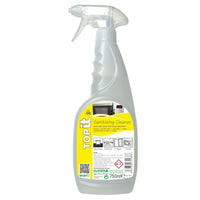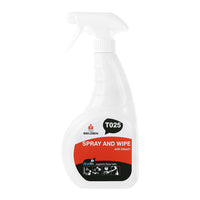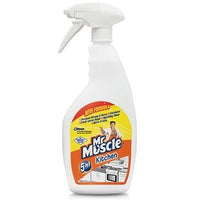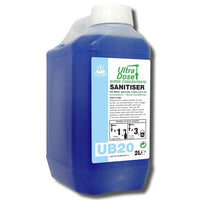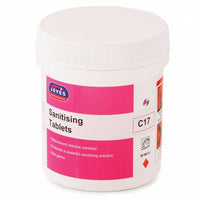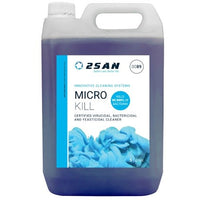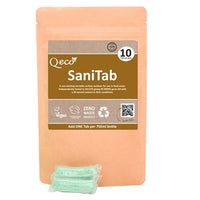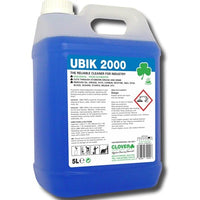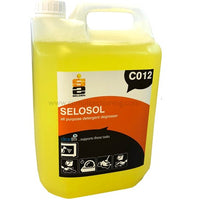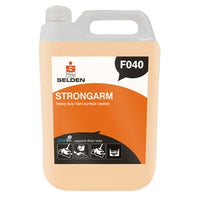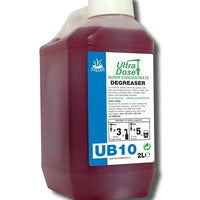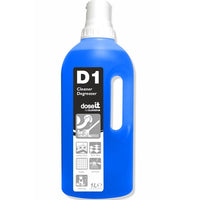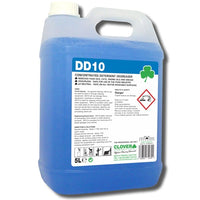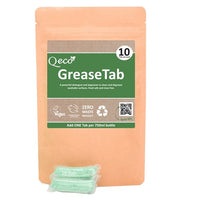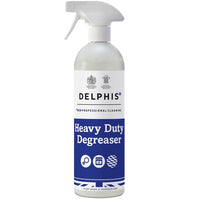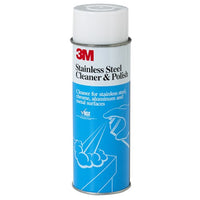Collection: Kitchen Cleaning Products
Wide range of kitchen cleaning products for domestic and professional use from top brands including Selden, Clover, HG and household favourites like Mr Muscle. Sanitisers, degreasers, disinfectants and specialty cleaners ensuring food safety compliance and effective grease removal across all kitchen environments.
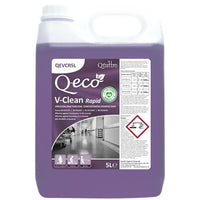
Kitchen Cleaners Product information
Kitchen cleaning represents one of the most demanding and critical cleaning challenges, requiring specialised products that address grease, food residues, bacterial contamination, and hygiene standards whilst maintaining food safety compliance and operational efficiency across domestic and commercial kitchen environments.
At ClickCleaning, we provide a comprehensive range of kitchen cleaning products suitable for both domestic and professional applications, featuring trusted brands including Selden, Clover, HG, and household favourites like Mr Muscle. Our extensive selection encompasses sanitisers, degreasers, disinfectants, and specialised treatments designed to meet diverse kitchen cleaning requirements whilst ensuring food safety and hygiene compliance.
The complexity of kitchen environments demands understanding diverse soil types including animal fats, vegetable oils, protein residues, carbohydrate
deposits, and microbial contamination that require targeted chemistry and application methods. Different kitchen challenges need specific product
formulations to achieve thorough cleaning whilst maintaining food safety standards and surface integrity.
Sanitising products such as TopIT Sanitising Cleaner and UltraDose Sanitiser provide essential antimicrobial activity for food contact surfaces, preparation areas, and equipment where pathogen control is critical for food safety compliance. These formulations combine cleaning efficacy with antimicrobial performance whilst maintaining food-safe characteristics essential for commercial kitchen operations.
Degreasing products including Selden Selosol, UltraDose Degreaser, and Clover DD10 address the challenging grease and oil deposits characteristic of
kitchen environments through alkaline chemistry designed to emulsify and remove stubborn fat deposits from surfaces, equipment, and extraction systems where conventional cleaners prove inadequate.
Disinfectant products like Versan Virucidal Surface Disinfectant and 2SAN Micro Kill provide comprehensive pathogen control against bacteria, viruses, and other microorganisms that pose food safety risks whilst maintaining appropriate contact times and surface compatibility essential for kitchen applications.
Concentrated formulations enable cost-effective operation through precise dilution control whilst reducing packaging waste and storage requirements. Products like Q-eco V-Clean Rapid and sachet systems demonstrate how concentration technology delivers professional performance whilst optimising
operational costs essential for commercial viability.
Tablet and sachet systems including Jeyes Defence Tablets and Q-Eco SaniTab provide convenient measurement, storage, and application advantages whilst ensuring consistent active ingredient concentrations. These products prove particularly valuable for portion control and reducing waste in busy kitchen environments.
Stainless steel cleaners such as 3M Stainless Steel Cleaner & Polish address the specific requirements of commercial kitchen equipment through formulations that clean, protect, and enhance stainless steel surfaces whilst preventing corrosion and maintaining professional appearance standards.
Food safety considerations ensure that kitchen cleaning products meet regulatory requirements for food contact surface cleaning, appropriate antimicrobial efficacy, and safe residue levels that prevent contamination whilst maintaining cleaning effectiveness essential for commercial kitchen
compliance.
Temperature compatibility enables products to work effectively across the diverse temperature conditions found in kitchen environments, from cold storage areas to heated cooking zones, whilst maintaining cleaning performance and safety characteristics throughout varied operational conditions.
pH considerations balance cleaning effectiveness with surface safety and food compatibility, with different formulations designed for specific kitchen applications including acidic products for mineral deposit removal and alkaline solutions for grease cutting and protein removal.
Surface compatibility ensures that kitchen cleaning products work safely across diverse materials including stainless steel, plastic, ceramic, and composite surfaces commonly found in modern kitchen environments whilst preventing damage and maintaining equipment longevity.
Application methods accommodate diverse kitchen cleaning requirements from spray-and-wipe procedures for routine sanitisation to immersion systems for equipment cleaning, with product selection depending on contamination levels, surface types, and operational constraints specific to kitchen environments.
Environmental considerations include selecting products that deliver required cleaning and antimicrobial performance whilst minimising environmental
impact through biodegradable formulations, efficient usage, and responsible disposal practices essential for sustainable kitchen operations.
Quality assurance ensures consistent performance across product ranges whilst meeting the reliability requirements essential for food service operations where cleaning effectiveness directly impacts food safety, regulatory compliance, and operational reputation.
Whether you're maintaining domestic kitchens requiring effective grease removal and hygiene, operating commercial food service facilities with stringent safety requirements, managing catering operations with demanding cleaning challenges, or addressing any application requiring professional kitchen cleaning capabilities, ClickCleaning offers solutions that combine proven effectiveness with food safety compliance.
Please contact us if you have any questions about our range we can assist with.
Kitchen Cleaners FAQ
What's the difference between kitchen sanitisers, degreasers, and disinfectants?
Kitchen sanitisers like TopIT reduce microbial contamination to food-safe levels for routine hygiene maintenance on food contact surfaces. Degreasers such as Selden Selosol target grease and oil deposits through alkaline chemistry that emulsifies fats for removal. Disinfectants like Versan provide comprehensive pathogen elimination against bacteria and viruses for critical infection control. Sanitisers suit frequent application during food preparation, degreasers address stubborn grease buildup, and disinfectants provide intensive antimicrobial treatment. Many commercial kitchens use all three strategically—sanitisers for routine cleaning, degreasers for equipment maintenance, and disinfectants for deep cleaning cycles. Selection depends on specific cleaning challenges and food safety requirements.
Are these products safe for food contact surfaces?
Products specifically formulated for kitchen use like TopIT Sanitising Cleaner and UltraDose Sanitiser are designed for food contact surface application when used according to manufacturer guidelines. Verify food-safe approvals and follow rinsing requirements where specified. Some products require rinsing after application whilst others provide no-rinse formulations for convenience. Always check local health department requirements for approved products and contact times. Household products like Mr Muscle may have different requirements than professional formulations. Never assume all cleaning products are food-safe—verify specific approvals and application procedures. Professional kitchen products typically provide clearer food safety guidance than general-purpose cleaners.
How do I choose the right degreaser for different kitchen applications?
Light grease and routine cleaning suit moderate degreasers like DoseIT D1 or Delphis Eco Heavy Duty Degreaser. Heavy grease buildup on equipment and extraction systems requires stronger formulations like Selden Strongarm or UltraDose Degreaser. Consider surface compatibility—stainless steel handles most degreasers whilst painted surfaces may need gentler formulations. Frequency of use affects selection—daily cleaning may use milder products whilst weekly deep cleaning needs stronger chemistry. Temperature also matters—hot water enhances degreasing action but some surfaces can't handle high temperatures. Concentrated products like Q-Eco GreaseTab offer cost advantages for high-volume operations. Always test compatibility and adjust application based on grease severity and surface requirements.
What contact times are required for effective kitchen sanitisation?
Contact times vary by product and target organisms, typically ranging from 30 seconds for quick sanitisers to several minutes for comprehensive disinfection. Products like TopIT specify contact times on labels—follow these guidelines for food safety compliance. Food contact surfaces often require shorter contact times for operational efficiency, whilst non-food surfaces may allow longer treatment periods. Heavily soiled surfaces may need pre-cleaning before effective sanitisation can occur. Hot water often reduces required contact times but verify temperature compatibility. Some products provide extended antimicrobial activity after initial contact time. Always maintain wet contact during specified periods—reapply if surfaces dry before completion. Understanding contact time requirements ensures food safety whilst maintaining practical kitchen workflows.
Can I use concentrated products in busy commercial kitchen environments?
Concentrated products like Q-eco V-Clean Rapid offer significant advantages in commercial kitchens through cost savings, reduced storage requirements, and consistent performance when properly diluted. However, ensure staff training on correct dilution procedures and consider automatic dosing systems for accuracy and convenience. Busy environments may benefit from having both concentrates for routine use and ready-to-use products for quick applications or emergency situations. Concentrates require mixing time and equipment that may not suit all operational workflows. Consider peak service periods when dilution preparation might be impractical. Many commercial kitchens successfully use concentrates with proper systems and training whilst maintaining ready-to-use options for immediate needs.
How do I maintain stainless steel kitchen equipment properly?
Stainless steel requires specific care to maintain appearance and prevent corrosion. Use products like 3M Stainless Steel Cleaner & Polish designed specifically for stainless steel rather than general cleaners that may cause spotting or damage. Clean in the direction of the grain to prevent scratching. Remove grease and food residues promptly to prevent staining. Avoid chlorine-based cleaners that can cause pitting and corrosion. Rinse thoroughly after cleaning to remove chemical residues. Regular maintenance prevents buildup requiring aggressive cleaning that might damage surfaces. Consider both cleaning and protective aspects—some products provide ongoing protection against fingerprints and water spots. Professional stainless steel products typically deliver better results than household alternatives for commercial equipment.
What safety precautions are essential when using kitchen cleaning chemicals?
Never mix different cleaning products, especially acids and alkalis or sanitisers and degreasers, which can create dangerous reactions. Ensure adequate ventilation when using strong degreasers or sanitisers. Store products away from food and food preparation areas in appropriate chemical storage. Label diluted products clearly and date preparation. Train staff on proper handling, dilution, and emergency procedures. Wear appropriate protection including gloves when handling concentrates. Keep safety data sheets accessible and maintain first aid supplies. Avoid cross-contamination between cleaning chemicals and food. Consider timing applications to minimise exposure during food preparation. Most kitchen cleaning products are safe when used correctly but require proper handling procedures and staff awareness.
How do I address persistent grease buildup in commercial kitchens?
Persistent grease requires systematic approach combining appropriate chemistry with proper technique. Use heavy-duty degreasers like Selden Strongarm for severe buildup, allowing adequate contact time for chemical action. Hot water enhances degreasing effectiveness but verify surface compatibility. Consider immersion cleaning for removable equipment parts. Multiple treatments may be necessary for extreme buildup rather than expecting single application success. Address extraction systems and hidden areas where grease accumulates. Implement regular maintenance cleaning to prevent severe buildup requiring intensive treatment. Some areas may need mechanical action combined with chemical treatment. Professional assessment may be needed for valuable equipment or persistent problems requiring specialised approaches.
What's the most cost-effective approach to kitchen cleaning product selection?
Focus on versatile products that address multiple cleaning challenges rather than numerous specialist items. Concentrates like UltraDose systems often provide better value than ready-to-use alternatives for high-volume operations.
Consider total costs including labour time, training requirements, and equipment needs rather than unit pricing alone. Monitor usage patterns to identify optimal product selections and avoid waste. Bulk purchasing provides cost advantages but balance storage capacity with usage rates. Professional products may cost more initially but often deliver better performance requiring less product and time. Calculate cost per application rather than cost per container. Quality products that deliver consistent results often prove more economical than cheaper alternatives requiring additional time or multiple applications.
How do I ensure compliance with food safety regulations when using kitchen cleaners?
Use only products approved for food service applications and follow manufacturer guidelines for food contact surface cleaning. Verify antimicrobial efficacy claims meet regulatory requirements for your specific applications. Maintain documentation of cleaning procedures, product usage, and training records as required by health authorities. Follow specified contact times and rinsing procedures exactly. Store cleaning chemicals separately from food according to regulations. Train staff on proper application procedures and food safety protocols. Monitor cleaning effectiveness through appropriate testing where required. Keep safety data sheets and product information accessible for inspector review. Consider working with suppliers who understand food service requirements and can provide compliance guidance. Regular review of procedures ensures ongoing compliance with evolving regulations.


